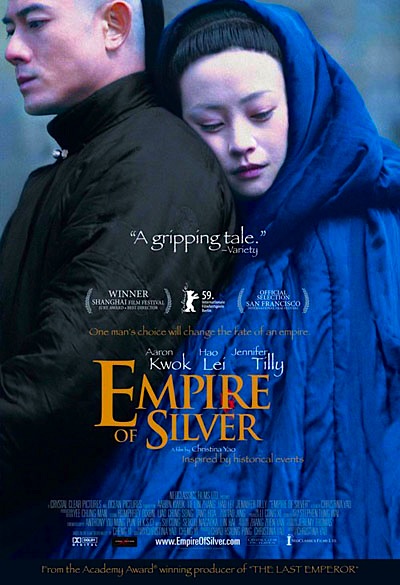By Joe Bendel. Initially, the late Qing Dynasty’s new paper money is an economic boon, especially helpful facilitating transactions for the lower classes. Unfortunately, when the people come to suspect it is not fully backed by silver, it leads to bank runs. This is an ominous development for Lord Kang’s financial dynasty. Yet he will face even greater tribulations within his own family in Christina Yao’s Empire of Silver, which opens tomorrow in New York.
In 1899, the “piaohao” bankers of Shanxi were like Tom Wolfe’s “Masters of the Universe.” Lord Kang, or “Old Master” as he is often called, assumed four sons would be sufficient to ensure a safe line of succession for his venerable banking company. Of course, as a pious Buddhist deaf-mute, “First Master” never really counted. Unfortunately, when the Second and Fourth Masters are undone by calamity partly of his own making, old Kang is left with the dissolute playboy Third Master. Still, he is probably the most talented of the lot, but he has heretofore squandered his life out of resentment for his father’s Machiavellian management of family affairs. This is Third’s time to chart his ascendance, but it remains unclear whether he wishes to assume the mantle of leadership.
 Needless to say, Old and Third Masters have very different management philosophies. However, his relationship to his young stepmother is even more strained. Quickly we come to understand Third and his former teacher had quite a bit of history before she became Madame Kang, which obviously explains much.
Needless to say, Old and Third Masters have very different management philosophies. However, his relationship to his young stepmother is even more strained. Quickly we come to understand Third and his former teacher had quite a bit of history before she became Madame Kang, which obviously explains much.
Silver is a big historical melodrama, but there is only a spot of actual fighting here and there. Still, the costumes, sets, and sweeping vistas are worthy of epics like Hero and Red Cliff. Jeremy Thomas, the producer of ambitious films like The Last Emperor, Little Buddha, and Merry Christmas Mr. Lawrence, served as executive producer, lending Silver further prestige.
While Silver is indeed a finely crafted period production, Aaron Kwok is surprisingly flat as Third Master. Yes, his character is emotionally damaged, but at some point we should see some signs of life percolating. Still, Hao Lei largely compensates as Madame Kang with her exquisite expressiveness. Frankly it is just nice to see her working, considering she appeared in Lou Ye’s bold Tiananmen Square drama Summer Palace, which was duly banned by the Communist authorities. Silver also boasts a number of rich supporting performances, particularly Ding Zhi Cheng and Lei Zhen Yu as two rival branch managers – one talented but dangerously independent, while the other is deemed controllable by virtue of his mediocrity.
Yao revels in the classical tragedy of her story, but she periodically offers up shrewd nuggets of insight as well. It is intriguing to look at a proud family and their celebrated house of finance – increasingly destabilized by China’s mounting anarchy – but it might well be too restrained and respectable for fanboys. An engaging feature directorial debut for Yao (if not a perfect star vehicle for Kwok), Silver opens today (6/3) in New York at the AMC Empire and AMC Village 7.
Posted on June 3rd, 2011 at 1:37pm.
Worthless paper money, financial manipulations, bubbles…sounds like there are lots of parallels to our own situation today.
I read in the review in the Wall Street Journal that the Chinese Communists allowed this to be made because it has an anti-capitalist subtext. Did you see that in the film, or is that reading too much into it?